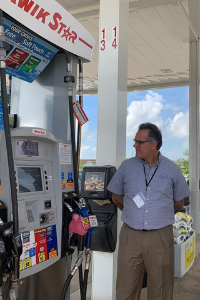The burgeoning ethanol market in Mexico represents 1.2 billion gallons in potential demand, and the U.S. Grains Council (USGC) is supporting Mexican gasoline retailers as they learn how to use this readily available, economically advantageous and environmentally friendly source of octane.
As part of these efforts, the Council worked with the American Coalition for Ethanol (ACE) and the Iowa Renewable Fuels Association (IRFA) this month to organize a team of Mexican gasoline retailers to examine the ethanol refinery process in Iowa from the corn farm to the fuel station.
“This was a really excellent mission comprised of major station retailers throughout Mexico, representing half a billion gallons a year of fuel demand,” said Heidi Bringenberg, USGC assistant director in Mexico. “These folks were all pro-ethanol and ready to import to make their businesses more competitive.”
U.S. ethanol exports to Mexico have tremendous growth potential due to ongoing liberalization of the Mexican petroleum industry. Changes in Mexican law took effect in June 2017 that allow up to an E10 blend outside of three major cities (Monterrey, Mexico City and Guadalajara). The Council is providing information and resources to these groups to encourage lifting the prohibition of ethanol in these cities, promote homogenization of Mexican gasoline specifications to those from the United States and support long-term expansion in ethanol blending levels.
“The total Mexican gasoline supplies are at about 12.5 billion gallons. Using E10 would equate to more than 1.2 billion gallons of ethanol demand,” Bringenberg said. “If Mexico was to even buy half of that from the United States and produce the other 50 percent, it would be a huge win-win for both countries.”
The team explored the ethanol industry in Iowa, including stops at fueling stations, a pipeline terminal, a blending facility and an ethanol plant. During these visits, the retailers learned about how the U.S. renewable industry developed, how ethanol can benefit the rural and national economies, how to market gasoline and even about brand management for promoting ethanol.
“This mission really served to show that with little to no modifications to existing equipment, these retailers can be ready for ethanol,” Bringenberg said. “Seeing how ethanol is used in the United States and how advanced the industry is in Iowa gave them a lot of hope and vision for Mexico.”
USGC programs continue to focus on helping retailers understand the benefits of increased ethanol use. Current U.S. ethanol exports to Mexico are primarily for industrial uses like perfumes, solvents and beverages, but more retailers in border cities are buying pre-blended E10 at U.S. terminals for resale at convenience stores and service stations.
U.S. ethanol exports to Mexico have increased by more than 3.5 million gallons between the 2016/2017 and 2017/2018 marketing years, from 27.6 million gallons to 31.1 million gallons, respectively.
Mexico has purchased more than 25.9 million gallons of U.S. ethanol, equivalent to 9.1 million bushels of corn, thus far in the 2018/2019 marketing year (Sept. 2018 – May 2019), up nearly 12 percent year-over-year and ranking as the 10th largest market for U.S. ethanol.
Following the visit to Iowa, Mexican team members set goals of commissioning local studies on ethanol, developing specific asks for regulatory officials, clarifying current import regulations, communicating ethanol’s benefits to shareholders and working together as an industry to invest in additional infrastructure to store and distribute ethanol as more stations open using E10.
“After this trip, Mexico’s industry will be a stronger voice in advocating to their own government on behalf of ethanol,” Bringenberg said. “We have a lot of work still to do to help the Mexican market, but these retailers are excited and ready for trials of E10.”
Learn more about the Mexican team’s excitement about ethanol.
About The U.S. Grains Council
The U.S. Grains Council develops export markets for U.S. barley, corn, sorghum and related products including distiller’s dried grains with solubles (DDGS) and ethanol. With full-time presence in 28 locations, the Council operates programs in more than 50 countries and the European Union. The Council believes exports are vital to global economic development and to U.S. agriculture’s profitability. Detailed information about the Council and its programs is online at www.grains.org.


